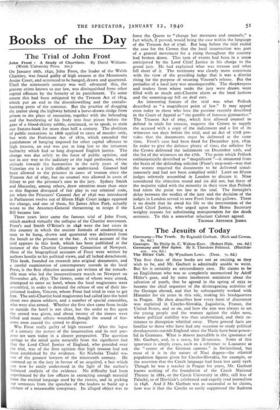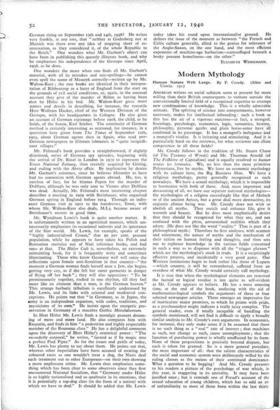The Jesuits of Today
The Hitler Cult. By Wyndham Lewis. (Dent. 7s. 6d.) THE first three of these books are not as exciting as they wish to be, and Mr. Garbutt is admittedly unable to write.
But his is certainly an extraordinary case. He claims to be an Englishman who was so completely mesmerised by Adolf
Hitler's gaze, and by some incoherent sentiment about the salvation of youth, that he agreed in the spring of 1932 to become the chief organiser of the disintegrating activities of
the Gestapo abroad, and that he subsequently worked with Himmler for six years in this role, making his headquarters
in Prague. He then describes how every form of discontent was exploited in Czecho-Slovakia, Jugoslavia, France, the United States, and so on, and how the aim was always to set the young people and the women against the older men, whose political stability was thus undermined, and their re- sistance to disruption whittled away. These general facts are familiar to those who have had any occasion to study political developments outside England since the Nazis have been power- ful in Germany. What is almost incredible is the ignorance of Mr. Garbutt, and, in a sense, his ill-success. Some of this ignorance is simply crass, such as a reference to Lausanne as the " centre of the German cantons " in Switzerland, but most of it is in the nature of Nazi dogma—the ethnical population figures given for Czecho-Slovakia, for example, or the assertion that the Czech language had been lost until 1918.
Though he was a teacher in Prague for years, Mr. Garbutt knows nothing of the foundation of the Czech National Theatre in 1881, or the Czech University in 1882, still less of PalackY, or of HavIkek's celebrated and eagerly read journalism in 1848. And if Mr. Garbutt was as successful as he claims, how was it that the Czechs so easily suppressed the Sudeten German rising on September 13th and 14th, 1938? He writes very frankly, at any rate, that " neither at Godesberg nor at Munich was there ever any idea of stopping short of re- annexation, as they considered it, of the whole Republic to the Reich." One wonders what Mr. Garbutt's object can have been in publishing this queerly illiterate book, and why he emphasises his independence of the Gestapo since April, 1938, as he does.
One wonders the more when one finds all Mr. Garbutt's material, with all its mistakes and mis-spellings—he cannot even spell the name of Masaryk correctly—written up by Mr. Walton-Kerr ; the two books are identical in their interpre- tation of Ribbentrop as a hater of England from the start on the grounds of evil social conditions, or, again, in the unusual account they give of the murder of Rohm as having been shot by Hitler in his bed. Mr. Walton-Kerr gives more names and details in describing, for instance, the versatile Herr Wolfram Hacker, chief of the Western Division of the Gestapo, with his headquarters in Cologne. He also gives an account of German espionage before 1918, the child, as he holds, of the Saxon, Karl Stieber. The continuity of German method is certainly interesting as mirrored, for instance, in a quotation here given from The Times of September 12th, 1915, about German agents then in Spain, who read pro- German newspapers to illiterate labourers in " quite insignifi- cant villages."
Mr. Felstead's book provides a straightforward, if slightly disjointed, series of German spy episodes, beginning with the arrival of Dr. Rosel in London in 193o to represent the Essen National Zeitung, then recently acquired by Goring, and ending with the Abetz affair. By implication he denies Mr. Garbutt's existence, since he believes Himmler to have had no connexion with German agents abroad. He, too, is careless of fact, for he blames Papen for the murder of Dollfuss, although he was only sent to Vienna after Dollfuss was dead. Actually, Mr. Felstead's most interesting chapter describes a meeting in 1929 with Steinhauer, who organised German spying in England before 1914. Through an indis- creet German visit in 1911 to the hairdresser, Ernst, with whom Mr. Walton-Kerr also deals, M.I.5. became aware of Steinhauer's secrets in good time.
Mr. Wyndham Lewis's book is quite another matter. It is unfortunately written in an egotistical manner, which un- necessarily emphasises its occasional naivetes and its ignorance of the Slav world. Mr. Lewis, for example, speaks of the "highly industrialised Croats," that 90 per cent. peasant population, while he appears to have taken his Polish and Rumanian statistics out of Nazi reference books, and bad ones at that. The Hitler Cult is, nevertheless, an extremely stimulating book, for it is frequently witty and sometimes illuminating. Those who know Germany well will enjoy the reflections upon female anti-Semitism in that country—" the moment a German woman finds herself near a Jew, she begins getting very coy, as if she felt her outer garments in danger of flying off her back " ; they will also appreciate: " To be promiscuously together, rocked in one rhythm, till they feel more like an element than a man, is the German heaven." This strange barbaric tribalism is excellently understood by Mr. Lewis, and its links with oriental and mediaeval con- ceptions. He points out that " in Germany, as in Japan, the army is an independent organism, with codes, traditions, and mysticisms of its own." He insists upon the energetic pre- servation in Germany of a macabre Gothic Mittelaltertum.
In Herr Hitler Mr. Lewis finds a nostalgic peasant dream- ing of more and more land. He also compares him with Rasputin, and finds in him " a pedestrian and highly respectable member of the Rousseau class." He has a delightful comment upon the discovery of Herr Hitler's oratorical power : " The ex-orderly corporal," he writes, " turned as if by magic into a perfect Pied Piper." As for the issues and perils of today, Mr. Lewis has plenty to say about them. He points out that, whereas other imperialists have been accused of treating the coloured races as one wouldn't treat a dog, the Nazis deal such treatment out to other Europeans—on their own showing a more unpleasant crime. Mr. Lewis thus emphasises some- thing which has been clear to some observers since they first encountered National Socialism, that " Germany under Hitler is so highly nationalised and so unaltruist in its emotions, that it is potentially a top-dog class (in the form of a nation) with which we have to deal." It should be added that Mr. Lewis today takes his stand upon internationalist ground. He defines the issue of the moment as between " the French and Celtic culture generally, allied to the genius for tolerance of the Anglo-Saxon, on the one hand, and the most efficient exponents of machine-age barbarism—camouflaged beneath a bosky peasant homeliness—on the other."
ELIZABETH WISKEMANN.



































 Previous page
Previous page